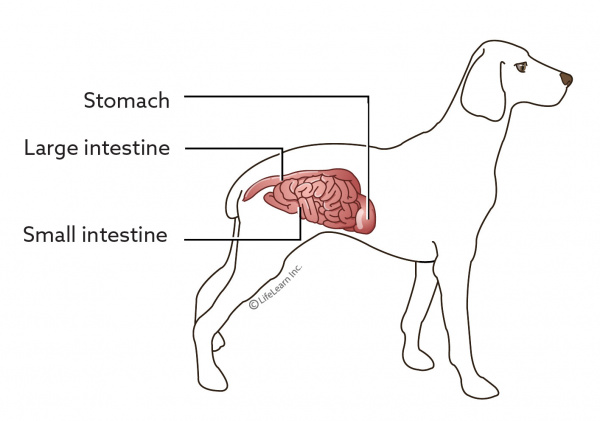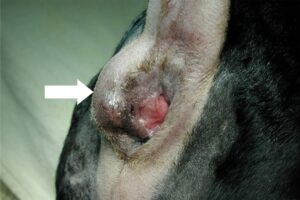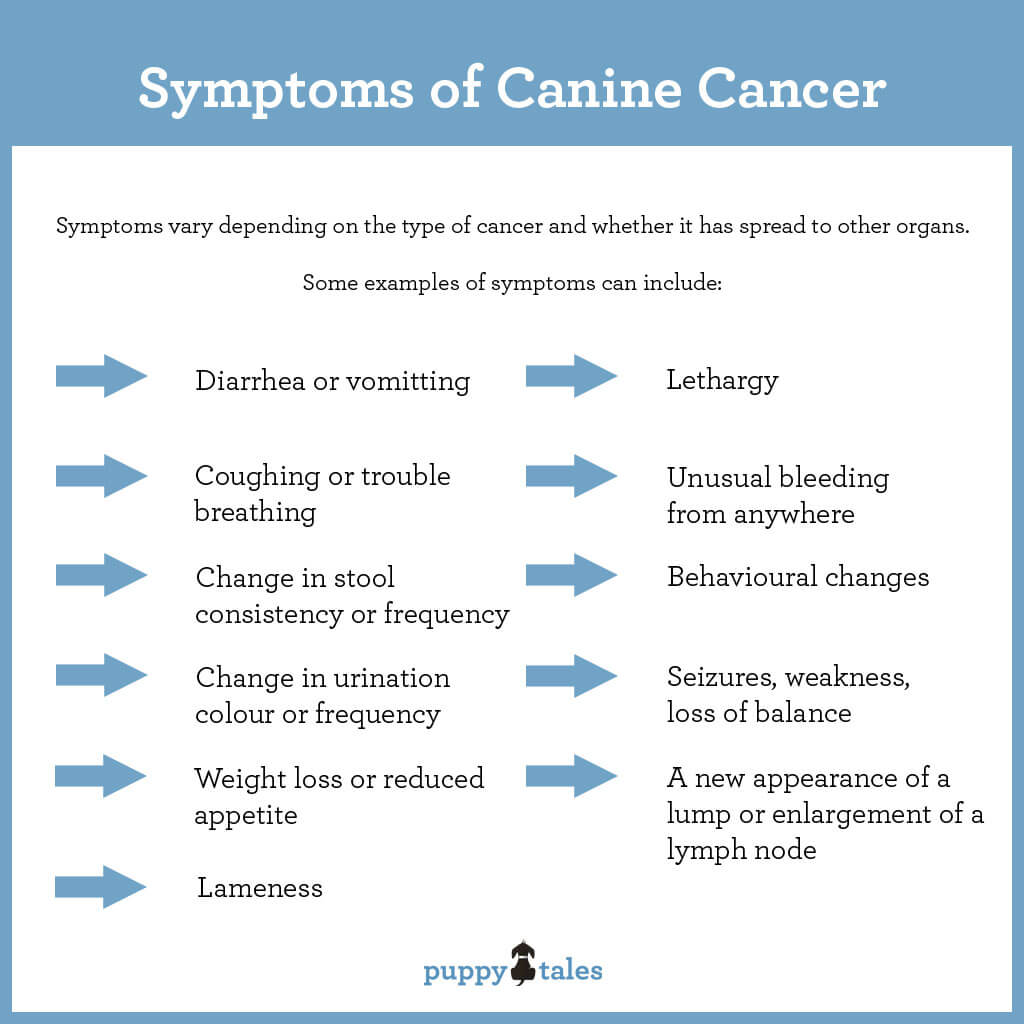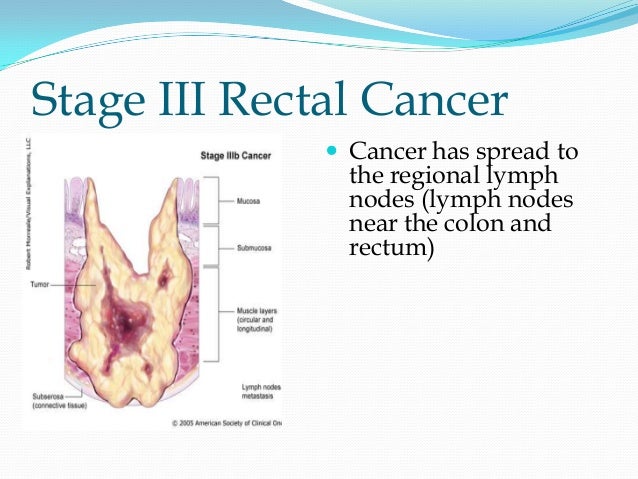Symptoms of colorectal cancer in dogs
Symptoms Of Colorectal Cancer In Dogs. The most common symptoms of bowel cancer in dogs are. Afflicted dogs have a tendency to experience a reduction in appetite which brings about weight reduction and lethargy of reducing blood sugar. Most dog tumors in the large intestine are in the rectum called colorectal tumors. Diarrhea or constipation depending on where the tumor is located Unusual consistency and color of stool.
 Digestive Tract Intestinal Epithelial Tumors Vca Animal Hospital From vcahospitals.com
Digestive Tract Intestinal Epithelial Tumors Vca Animal Hospital From vcahospitals.com
Canine Colon Cancer Symptoms. If your dog has an anal gland tumor he may present some or all of these symptoms. Straining and displaying difficulty passing feces. Straining may accompany symptoms that include obvious pain while defecating including whimpering or yelping mucus in the feces diarrhea or constipation. Canine colon cancer exhibits symptoms which are very similar to irritable bowel syndrome and colitis. Symptoms associated with stomach cancer in both dogs and cats depend on how extensive the cancer is.
This type of cancer usually has a poor prognosis.
Lethargy and changes in mood. Most animals diagnosed with intestinal tumors are middle-aged or older and male dogs have a higher predisposition. Dogs suffering from rectal tumors usually have difficulty defecating. S ymptoms of cancer in dogs can be indistinct and varied. Blood in the stool. Rectal polyps are abnormal tissue growth on the mucous membrane of the rectum.
 Source: bluepearlvet.com
Source: bluepearlvet.com
The most common type is an adenocarcinoma. It commonly affects older dogs usually more than six years of age. Depending on the type of cancer the symptoms can range from digestive problems to skin ulcerations seizures and more. You might also see blood in the feces. Canine Colon Cancer Symptoms.
 Source: ilmupopuler4.blogspot.com
Source: ilmupopuler4.blogspot.com
Symptoms are most commonly related to the gastrointestinal system and include. You should certainly take your dog to the vet if you have discovered a lump on the surface of the skin but not all surface lumps are cancers. If your dog has an anal gland tumor he may present some or all of these symptoms. You might also see blood in the feces. In one study it was confirmed that some breeds such as Boxers Shepherds Poodles and Spaniels are more likely to develop colorectal tumors.
 Source: contoh-soalsmp.blogspot.com
Source: contoh-soalsmp.blogspot.com
Other signs âof tumours benign or cancerous affecting internal organs can include. In one study it was confirmed that some breeds such as Boxers Shepherds Poodles and Spaniels are more likely to develop colorectal tumors. This type of cancer usually has a poor prognosis. Possible symptoms of adenocarcinomas include weight loss diarrhea and loss of appetite. Certain breeds such as Collies and German Shepherds are more likely to develop adenocarcinoma.
 Source: vcahospitals.com
Source: vcahospitals.com
Chronic or frequent bouts of constipation with the dog taking a long time to pass stools and straining and potentially showing signs of pain when having a bowel movement. Abdominal pain may also be present in pets with stomach cancer. Most animals diagnosed with intestinal tumors are middle-aged or older and male dogs have a higher predisposition. Dogs with bowel cancer cannot properly process. Vomiting is often profuse and will contain gastric acid and occasionally blood.
 Source: bluepearlvet.com
Source: bluepearlvet.com
Symptoms of Colon Cancer in Dogs A dog with colon cancer will develop diarrhea and will vomit. Rectal polyps can be found in the last section of the digestive tract and may protrude from. This type of cancer usually has a poor prognosis. Symptoms associated with stomach cancer in both dogs and cats depend on how extensive the cancer is. Chronic or frequent bouts of constipation with the dog taking a long time to pass stools and straining and potentially showing signs of pain when having a bowel movement.
 Source: vcahospitals.com
Source: vcahospitals.com
Abdominal pain may also be present in pets with stomach cancer. Symptoms of Colon Cancer in Dogs A dog with colon cancer will develop diarrhea and will vomit. Symptoms associated with stomach cancer in both dogs and cats depend on how extensive the cancer is. Chronic or frequent bouts of constipation with the dog taking a long time to pass stools and straining and potentially showing signs of pain when having a bowel movement. An anal gland tumor is not always obvious to the eye as the tumor may be growing inward.
 Source: ilmupopuler4.blogspot.com
Source: ilmupopuler4.blogspot.com
While either of these conditions can lead to colon cancer or be present because of it a full examination may be warranted. Straining may accompany symptoms that include obvious pain while defecating including whimpering or yelping mucus in the feces diarrhea or constipation. Cancer of the colon is diagnosed at home is difficult because the first symptoms act like a number of gastrointestinal disorders. Other types of tumors include. This bone cancer grows very quickly and frequently spreads to other areas of the body especially lymph nodes lungs and other bones.
 Source: puppytales.com.au
Source: puppytales.com.au
It commonly affects older dogs usually more than six years of age. Straining may accompany symptoms that include obvious pain while defecating including whimpering or yelping mucus in the feces diarrhea or constipation. Dog breed is not a predictor of large intestinal cancer with the average age of the patient of 11 years or older. The thought of colon cancer is certainly a frightening prospect but keep in mind there are many noncancerous causes of these symptoms. Other types of tumors include.
 Source: wagwalking.com
Source: wagwalking.com
In one study it was confirmed that some breeds such as Boxers Shepherds Poodles and Spaniels are more likely to develop colorectal tumors. An anal gland tumor is not always obvious to the eye as the tumor may be growing inward. Hindawis Academic Journals Cover A Wide Range of Disciplines. Straining and displaying difficulty passing feces. If your dog is showing signs of rectal polyps he should be seen by a veterinarian.
 Source: ilmupopuler4.blogspot.com
Source: ilmupopuler4.blogspot.com
A sore that wont heal should also be investigated. While either of these conditions can lead to colon cancer or be present because of it a full examination may be warranted. Symptoms are most commonly related to the gastrointestinal system and include. Other types of tumors include. Canine colon cancer exhibits symptoms which are very similar to irritable bowel syndrome and colitis.
 Source: firstvet.com
Source: firstvet.com
Hindawis Academic Journals Cover A Wide Range of Disciplines. Most dog tumors in the large intestine are in the rectum called colorectal tumors. Most animals diagnosed with intestinal tumors are middle-aged or older and male dogs have a higher predisposition. Because of its aggressive nature osteosarcoma is usually detected after the cancer has already spread. Other signs âof tumours benign or cancerous affecting internal organs can include.
 Source: dogtime.com
Source: dogtime.com
Dogs suffering from rectal tumors usually have difficulty defecating. Dogs suffering from rectal tumors usually have difficulty defecating. Vomiting normal projectile or bloody vomit Loss of appetite and refusal to eat. If your dog has an anal gland tumor he may present some or all of these symptoms. Diarrhea or constipation depending on where the tumor is located Unusual consistency and color of stool.
If you find this site adventageous, please support us by sharing this posts to your preference social media accounts like Facebook, Instagram and so on or you can also save this blog page with the title symptoms of colorectal cancer in dogs by using Ctrl + D for devices a laptop with a Windows operating system or Command + D for laptops with an Apple operating system. If you use a smartphone, you can also use the drawer menu of the browser you are using. Whether it’s a Windows, Mac, iOS or Android operating system, you will still be able to bookmark this website.






